Honours and awards
Foreign honours
 Czechoslovakia: Officer of the Order of the White Lion (1946) [15]
Czechoslovakia: Officer of the Order of the White Lion (1946) [15]
Robert Cloutman Dexter (1887 – 1955) was the founder of the Unitarian Service Committee (progenitor of the Unitarian Universalist Service Committee), which worked before and during World War II to rescue and assist refugees from Nazi Germany. [1] Dexter headed the Unitarian's office in Lisbon, Portugal during World War II. The Unitarians and other humanitarian organizations helped thousands of intellectuals and artists, many of them Jews, fleeing the Nazis to emigrate to safety in the United States and other countries. Dexter also worked with the clandestine Office of Strategic Services (OSS), providing information about Nazi Germany to the U.S. from his network of refugee workers in France, Spain, and Portugal.
Dexter was born on October 1, 1887, in Shelburne, Nova Scotia of an American mother and a Canadian father, who was a sea captain. Robert grew up in Boston and graduated from Brown University in 1912 with a B.A. and later acquired an M.A. from Brown. Over the next years he served as a social worker for a number of small organizations and with the entry of the United States into World War I he worked for the American Red Cross, supervising camps for soldiers in the South East. In 1915, he married Elisabeth Anthony, and they both studied for doctorates at Clark University, he in sociology and Elisabeth in history. They both taught at Skidmore College from 1923 to 1927, and moved to Cambridge Massachusetts in 1927 when Robert Dexter accepted a position as head of the Departments of Social and International Relations for the American Unitarian Association, a job that entailed many visits to liberal religious congregations in Europe. [1]
In 1937 and 1938, Dexter, Director of Foreign Relations of the American Unitarian Association, and his wife visited Czechoslovakia and the congregation in Prague led by Norbert Capek, which at that time was the largest Unitarian congregation in the world. The Unitarians and the Dexters also had strong ties to the Masaryk family. During this period, Dexter wrote detailed reports on the plight of refugees in the Sudetenland and Czechoslovakia and Jewish refugees from Austria (which was annexed by Nazi Germany in 1938). He proposed a new organization to help refugees which would be modeled on that of the American Friends Service Committee (Quakers). Prior to Dexter's initiatives the American Unitarians had not been involved in helping refugees. [2] Unlike the Quakers, however, the Unitarians took sides. Unitarian Charles Joy said, "I conceive our work to be strengthening of the side which we believe to be right." [3]
With permission from his Board of Directors, Dexter recruited a Unitarian minister, Waitstill Sharp and his wife Martha, to go to Czechoslovakia in early 1939 to help the refugees, At the time more than 200,000 refugees, many of them Jews, from Nazi Germany, Austria, and the Sudetenland were in Czechoslovakia and living under difficult conditions. Martha and Waitstill Sharp remained in the country after the Germans occupied Czechoslovakia in early 1939, and they were effective in their programs for both relief and emigration. The success of the Sharps’ activities increased momentum for the founding of the Unitarian Service Committee, which was officially launched in the spring of 1940, for the purpose of helping endangered refugees. Robert Dexter became executive director of the organization. [4] [5]
World War II was underway, but the United States was still a neutral when the Sharps returned to Europe to focus on helping refugees in France after the country fell to Nazi Germany in June 1940. They had the dual objective of providing aid to needy people and refugees plus aiding in the emigration of threatened people from Vichy France, still unoccupied but heavily influenced by the Germans. Dexter opposed aid to people in France. He wanted the Sharps to focus on emigration, helping intellectuals and artists, the kulturträgers (transmitters of culture), escape the Nazis. Dexter in the Unitarian office in Boston believed that relief aid to people in Vichy France, a near-puppet state of the Germans, helped the Nazis. In June 1941, he agreed with the statement by another Unitarian that "A few men and women of ability and prominence saved are more worthwhile than a hundred to whom we simply give a bit of food and whose agony we help to prolong." [6] [7] The opposite view was expressed by Charles Joy in March 1941. "It is better to keep 6,000 children alive in France than take a hundred or so to America." [8]
Waitstill Sharp felt betrayed by his old friend, Dexter, and the Sharps continued their dual programs of aid and emigration in France despite Dexter's opposition. [9]
Dexter and his wife Elisabeth arrived in Lisbon, Portugal on 24 April 1941 to take charge of the Unitarian office there, replacing Charles Joy. [10] Dexter was in Portugal for six months. During 1941, the Unitarians helped 541 refugees leave Portugal, mostly to the United States but about one-fifth went to Latin America. About one-third of the refugees were also helped by Varian Fry's Emergency Rescue Committee in Marseilles. [11]
In July 1942, while still working for the Unitarians, Robert and Elisabeth Dexter accepted an assignment with the Office of Strategic Services and were given the code names “Corn” and "Cornette" They returned to Portugal and agreed to deliver money to French resistance leaders. Elisabeth and he collected information about the Germans for the OSS. On behalf of both the Unitarians and the OSS, Dexter traveled to France and Switzerland from his office in Lisbon in September and October 1942 with the dual purpose of picking up the pieces of Varian Fry's organization after his departure and setting up a network of Unitarians who would spy for the OSS in addition to their programs to help refugees. [12]
In 1944, Dexter became the representative of the U.S. War Refugee Board in Portugal. In October 1944, both Dexters resigned from the Unitarian Service Committee, apparently irritated that Charles Joy had received a promotion. In November he resigned from the War Refugee Board. Dexter wanted to continue to work with the OSS, but in January 1945, the OSS declined to recommend him for a passport with the comment that Dexter "was temperamentally indiscreet" and "better suited for welfare work than for our type operations." Dexter's wife had concealed from him her knowledge of the date of the American army's landing in North Africa. [13]
In his later years, Dexter worked for the Church Peace Union. Dexter found his loyalty to the United States in question during the McCarthy era because of his association with Noel Field, a suspected spy for the Soviet Union. The U.S. cancelled his security clearance. Dexter died in 1955 following an extended period of depression. [14]
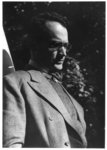
Varian Mackey Fry was an American journalist. Fry ran a rescue network in Vichy France from August 1940 to September 1941 that helped 2,000 anti-Nazi and Jewish refugees, mostly artists and intellectuals, escape from persecution by Nazi Germany during World War II.

The Kindertransport was an organised rescue effort of children from Nazi-controlled territory that took place in 1938–1939 during the nine months prior to the outbreak of the Second World War. The United Kingdom took in nearly 10,000 children, most of them Jewish, from Germany, Austria, Czechoslovakia, Poland, and the Free City of Danzig. The children were placed in British foster homes, hostels, schools, and farms. Often they were the only members of their families who survived the Holocaust. The programme was supported, publicised, and encouraged by the British government, which waived the visa immigration requirements that were not within the ability of the British Jewish community to fulfil. The British government placed no numerical limit on the programme; it was the start of the Second World War that brought it to an end, by which time about 10,000 kindertransport children had been brought to the country.

Hiram "Harry" Bingham IV was an American diplomat. He served as a Vice Consul in Marseilles, France, during World War II, and, along with several humanitarian organizations, helped more than 2,500 refugees, mostly Jews, to escape after the country was defeated by Nazi Germany in June 1940.
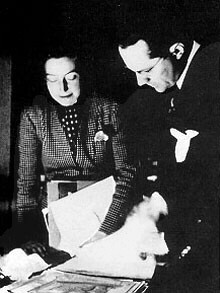
Miriam Davenport or Miriam Davenport Ebel was an American painter and sculptor, She worked with Varian Fry and the Emergency Rescue Committee in 1940 helping European Jewish and intellectuals refugees escape from German-occupied France during World War II.
Noel Haviland Field was an American diplomat who was accused of being a spy for the NKVD. His name was used as a prosecuting rationale during the 1949 Rajk show trial in Hungary, as well as the 1952 Slánský show trial in Czechoslovakia. Much controversy surrounds the Field story. In 2015, the historian David Talbot reignited claims that Field was set up by Allen Dulles in order to create paranoia designed to undermine the Soviet Union.

Martha Ingham Dickie Sharp Cogan was an American Unitarian who was involved in humanitarian and social justice work with her first husband, a Unitarian minister, Waitstill Sharp, and others of her denomination, and so helped hundreds of refugees, including Jews, to escape Nazi persecution, through relocation and other efforts. In September 2005, Martha and Waitstill Sharp were named by the Yad Vashem organization as "Righteous Among the Nations", the second and third of five Americans to receive this honor. The subsequent ceremony involved the presentation of a medal and certificate of honor to the Sharps' daughter, Martha Sharp Joukowsky, amidst a large audience that included one of the children that her parents had helped get out of France, Eva Esther Feigl.

HIAS is a Jewish American nonprofit organization that provides humanitarian aid and assistance to refugees. It was established on November 27, 1881, originally to help the large number of Russian Jewish immigrants to the United States who had left Europe to escape antisemitic persecution and violence. In 1975, the State Department asked HIAS to aid in resettling 3,600 Vietnam refugees. Since that time, the organization continues to provide support for refugees of all nationalities, religions, and ethnic origins. The organization works with people whose lives and freedom are believed to be at risk due to war, persecution, or violence. HIAS has offices in the United States and across Latin America, Europe, Africa, and the Middle East. Since its inception, HIAS has helped resettle more than 4.5 million people.
The Unitarian Universalist Service Committee (UUSC) is a non-profit, nonsectarian associate member organization of the Unitarian Universalist Association that works to provide disaster relief and promote human rights and social justice around the world.

Waitstill Hastings Sharp was an American Unitarian minister who was involved in humanitarian and relief work in Czechoslovakia and southern Europe in 1939 and 1940, just before and during World War II. With his wife, Martha, he provided relief aid to refugees, many of them Jewish, fleeing from Nazi Germany and countries under Nazi control and assisted people in danger of persecution to flee Czechoslovakia and France and resettle in the United States and elsewhere. In 2005, Wainstill and Martha were named by Yad Vashem as Righteous among the Nations, the second and third of five Americans to receive this honor.
Karl Bömelburg was an SS-Sturmbannführer (major) and head of the Gestapo in France during the Second World War. He notably had authority over section IV J, charged with the deportation of the Jews, for which Alois Brunner was responsible. His aliases included Charles Bois, Mollemburg, and Bennelburger.
Elisabeth Anthony Dexter was a social historian who contributed the longest-lived service in southern Europe on behalf of refugees from Nazi Germany, including Jews, of any American churchwoman during World War II.
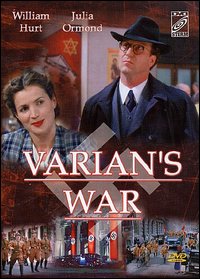
Varian's War is a 2001 joint Canadian/American/United Kingdom film made-for-television drama. The film was written and directed by Lionel Chetwynd, based on the life and wartime exploits of Varian Fry who saved more than 2,000 Jewish artists from Vichy France, the conquered ally of Nazi Germany. Varian's War stars William Hurt, heading an all-star ensemble cast of Julia Ormond, Matt Craven, Maury Chaykin, Alan Arkin and Lynn Redgrave.
Maria Weiterer was a German political activist, increasingly prominent in the Communist Party during the 1920s and 1930s.
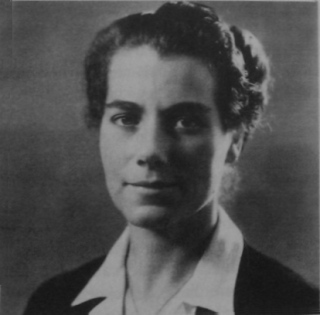
Beatrice Wellington, also known as Beatrice Gonzales, was a Canadian who worked to evacuate refugees from Czechoslovakia during the early stages of the occupation of that country by Nazi Germany in the months leading up to World War II. She headed the British Committee for Refugees from Czechoslovakia (BCRC) in Prague from April 1939 to August 1939, coordinating the efforts of many humanitarian organizations to help refugees flee Czechoslovakia. Wellington was questioned at length by the Gestapo on several occasions. She was successful in getting the German occupiers of Czechoslovakia to give exit permits to many refugees. In danger of arrest, she resisted the calls of the BCRC in London for her to depart Czechoslovakia and remained there until August 1939, leaving only a month before the beginning of World War II.
Susan Elisabeth Subak is an environmental scientist and author. She has worked for environmental agencies around the world and is known for her work on America's carbon footprint and climate change.
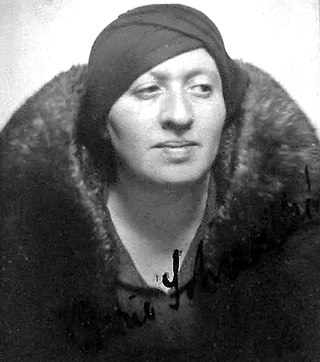
Marie Schmolka was a Czechoslovak Jewish activist and social worker who helped political refugees and Jewish adults and children escape the Protectorate of Bohemia and Moravia in the lead-up to World War II. She was a member of WIZO and WILPF. She had previously helped refugees from Germany who fled to Czechoslovakia after the Nazi rise to power. Schmolka headed the newly founded Czechoslovak Refugee Committee, and also chaired local HICEM. In July 1938, she represented Czechoslovakia at the Évian conference.
Portugal was officially neutral during World War II and the period of the Holocaust in German-occupied Europe. The country had been ruled by an authoritarian political regime led by António de Oliveira Salazar but had not been significantly influenced by racial antisemitism and was considered more sympathetic to the Allies than was neighbouring Francoist Spain.
The British Committee for Refugees from Czechoslovakia (BCRC), later the Czechoslovak Refugee Trust Fund, was a non-governmental organisation established in Prague in late September 1938, in the lead up to the Second World War, in response to the large number of refugees fleeing areas under control of Nazi Germany. Its purpose was to give humanitarian aid to refugees and resettle some of them in the United Kingdom or other countries. The BCRC aided political refugees, especially Social Democrats and communists, as well as Jews and their families, who fled Nazi Germany or the regions it annexed during 1938. The BCRC was initially funded by public donations and appeals following the Munich Agreement in September 1938 and ensuing German occupation of the Sudetenland. In January 1939 the British government gave four million pounds sterling to Czechoslovakia for assistance to refugees and their resettlement in other countries.
Donald Alexander Lowrie was an American humanitarian activist. He is best known for his work with the YMCA in France during World War II from 1940 to 1942. He helped anti-Nazi and Jewish refugees escape from Vichy France, which was dominated by Nazi Germany.

Refugee workers in Vichy France describes the work and lists the expatriates from several countries who assisted refugees in Vichy France during World War II, mostly from 1940 to 1942. As most European countries and British commonwealth countries such as Canada and Australia were engaged in the war, Americans and American humanitarian organizations became prominent in the task of providing aid to refugees fleeing Nazi Germany and German-controlled countries and seeking safety. Prior to the U.S. entry into World War II, "an American passport gave most Americans abroad a reasonably justified sense of invulnerability." Organizations from neutral Switzerland also assisted refugees. The refugee organizations employed or took on volunteers of many nationalities, including French people resident in Vichy.
{{cite journal}}: CS1 maint: DOI inactive as of January 2025 (link)William F. Schulz, contributor